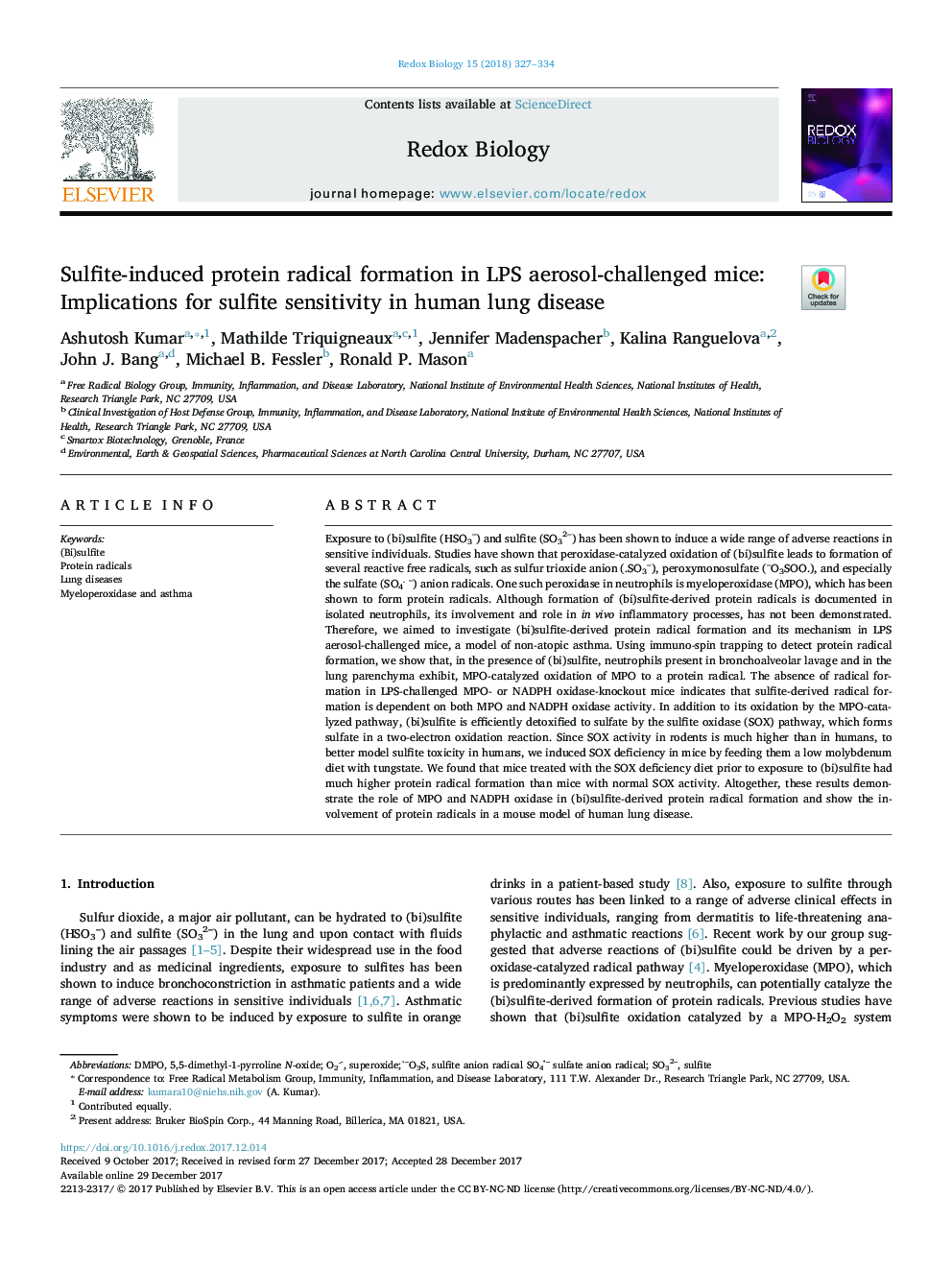| کد مقاله | کد نشریه | سال انتشار | مقاله انگلیسی | نسخه تمام متن |
|---|---|---|---|---|
| 8286639 | 1535835 | 2018 | 8 صفحه PDF | دانلود رایگان |
عنوان انگلیسی مقاله ISI
Sulfite-induced protein radical formation in LPS aerosol-challenged mice: Implications for sulfite sensitivity in human lung disease
دانلود مقاله + سفارش ترجمه
دانلود مقاله ISI انگلیسی
رایگان برای ایرانیان
کلمات کلیدی
موضوعات مرتبط
علوم زیستی و بیوفناوری
بیوشیمی، ژنتیک و زیست شناسی مولکولی
سالمندی
پیش نمایش صفحه اول مقاله

چکیده انگلیسی
Exposure to (bi)sulfite (HSO3-) and sulfite (SO32-) has been shown to induce a wide range of adverse reactions in sensitive individuals. Studies have shown that peroxidase-catalyzed oxidation of (bi)sulfite leads to formation of several reactive free radicals, such as sulfur trioxide anion (.SO3-), peroxymonosulfate (-O3SOO.), and especially the sulfate (SO4. -) anion radicals. One such peroxidase in neutrophils is myeloperoxidase (MPO), which has been shown to form protein radicals. Although formation of (bi)sulfite-derived protein radicals is documented in isolated neutrophils, its involvement and role in in vivo inflammatory processes, has not been demonstrated. Therefore, we aimed to investigate (bi)sulfite-derived protein radical formation and its mechanism in LPS aerosol-challenged mice, a model of non-atopic asthma. Using immuno-spin trapping to detect protein radical formation, we show that, in the presence of (bi)sulfite, neutrophils present in bronchoalveolar lavage and in the lung parenchyma exhibit, MPO-catalyzed oxidation of MPO to a protein radical. The absence of radical formation in LPS-challenged MPO- or NADPH oxidase-knockout mice indicates that sulfite-derived radical formation is dependent on both MPO and NADPH oxidase activity. In addition to its oxidation by the MPO-catalyzed pathway, (bi)sulfite is efficiently detoxified to sulfate by the sulfite oxidase (SOX) pathway, which forms sulfate in a two-electron oxidation reaction. Since SOX activity in rodents is much higher than in humans, to better model sulfite toxicity in humans, we induced SOX deficiency in mice by feeding them a low molybdenum diet with tungstate. We found that mice treated with the SOX deficiency diet prior to exposure to (bi)sulfite had much higher protein radical formation than mice with normal SOX activity. Altogether, these results demonstrate the role of MPO and NADPH oxidase in (bi)sulfite-derived protein radical formation and show the involvement of protein radicals in a mouse model of human lung disease.
ناشر
Database: Elsevier - ScienceDirect (ساینس دایرکت)
Journal: Redox Biology - Volume 15, May 2018, Pages 327-334
Journal: Redox Biology - Volume 15, May 2018, Pages 327-334
نویسندگان
Ashutosh Kumar, Mathilde Triquigneaux, Jennifer Madenspacher, Kalina Ranguelova, John J. Bang, Michael B. Fessler, Ronald P. Mason,